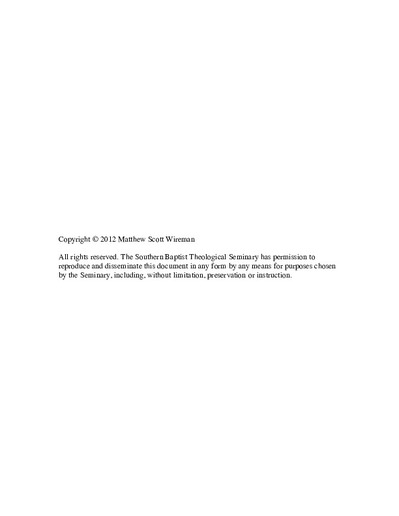| dc.description.abstract | Matthew Scott Wireman, Ph.D.
The Southern Baptist Theological Seminary, 2012
Chair: Dr. Stephen J. Wellum
This dissertation examines the Protestant doctrine of Scripture's self-witness of divine authority. Chapter 1 examines the current evangelical milieu. The doctrine has become nearly obsolete in the discussion of systematic theology. Consequentially, wherein lies authority has been greatly misunderstood in Protestant circles.
Chapter 2 surveys the doctrine through the history of the church. Particular note is made of Augustine, John Calvin, John Owen, and Herman Bavinck. This chapter evinces the near consensus of the church that the authority for the Church is found preeminently in the Scriptures.
Chapter 3 summarizes post-conservative, Stanley J. Grenz and John R. Franke, attempts to ground theology in Scripture plus culture and tradition. This chapter does not offer a critique as much as it aims to represent post-conservatives in their own words.
Chapter 4 looks at how the Old Testament viewed itself--particularly through the ministries of Moses and the prophets. YHWH chose representatives who would speak to the covenant community and write down the stipulations and history of YHWH's relationship with Israel for posterity.
Chapter 5 looks at the New Testament, which follows the paradigm instituted by the Old Testament. In the person and work of Jesus Christ, God's promises find their fulfillment, which foments his commissioning of the Twelve Apostles to be his spokesmen.
Chapter 6 ties together the threads that cohere in the two testaments of Scripture. It makes explicit the claims of Scripture that God is a se, he communicates with his creation, he uses spokesmen, and his written Word is its own witness for its authority.
Chapter 7 defines the doctrine of Scripture's self-witness and applies it to tradition, culture, and the task of apologetics. The chapter explicates the thesis of the dissertation that Scripture's self-witness must be the ground of systematic theology. | en_US |

